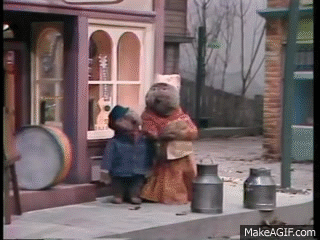Note; All gifs in this post are from the movie "Emmet Otter's Jugband Christmas", which is unequivocally the best otter-based holiday film to date. They are not at all related to the text.
The Storytime Underground Facebook Group is a great place to share successes and get all-around support from the global Youth Services community. Occasionally, there will be a question whose answers are so varied and possibly polarizing that I get sucked in and can't stop thinking about it. Last week there was a question like that:
 |
| Screenshot shared with permission of original poster. |
...how would YOU answer this question?I just had an older child (10+) ask me a very difficult question via an online reference service I volunteer for and I'm wondering how you all would handle it. They said that their parents say Santa is real, but all their friends say he isn't and they wanted to know if he is real or not. They disconnected from the service before I could give them an answer, but I'm trying to figure out what to say if it comes up again!I was considering linking them the "Yes Virgina, there is a Santa Claus" letter and telling them that he is real even if it's only in their heart and mind, but I'd love to hear what answers you might give in this situation. I wouldn't want to step on the parents' toes, but I wouldn't want to flat out tell them that Santa is real when they directly asked me about his existence. It's a bit of a sticky situation!
I really have to commend youth services librarians here, because the first response I've gotten from anyone NOT in youth services to this question is "Holy [expletive]!"
Full disclosure: I grew up in a Catholic family and every
year we celebrate the Polish tradition of Wigilia. After midnight mass, “Santa”
has historically come to our house. This includes last year, when the youngest
celebrating Christmas morning at our house was 30 years old. This is the lens
through which I viewed this question. I understand I am viewing this question from a privileged place, and I also acknowledge that there is privilege in wanting your child to believe in Santa at all.
I think this question and its responses were so interesting
to me because I immediately knew what I would do: just like when kids ask about
the existence of Big Foot, or the Loch Ness Monster, or Darth Vader, I would
ask, “Hmm, what do YOU think?”, listen, and invite them into the library to
look at some books about the topic. Do you know for a FACT that “Star Wars” is
not a documentary shot in real time? Are you absolutely sure?
BUT. BUT. As I read
through the comments, my “oh, of course!” idea of what to do was massaged into
a grey area putty. Some affirmed Heather’s thought that “Yes, Virginia,” would
be a good start. Some commented that the answer would be a truthful, if gentle,
“no”, to which others responded with tales of heartbreak as children or for their
children.
It was difficult for me to wrap my head around some
responses, but, having made a commitment to myself against the easy shame-based and absolutely not trauma-informed thoughts I discussed in my Pearl Clutcher post, I strove to understand where
those responses might be coming from and took a critical look at my own.
The way I see it, it appears as though the commenters who
answered this question, as youth services staff, value the same thing:
connection. When running a reference interview, we value connecting patrons to
resources and answers, as well as connecting with each patron through
relationship building.
It was which of these that edged out in priority for the
commenters that intrigued me most.
Relationships
Given my answer above, you may have realized that this is
what I prioritize in reference interviews. Well, sometimes. In this particular
case. My desire to connect with the patron on a personal level, and find out
why they are asking and maybe let them feel heard, out-edges my priority to
provide them with the answer that might be generally accepted as “correct”.
While this was my first response, and one I could defend with talk about
relationship building in the library, I could definitely see how it could be a
detriment depending on the child. By not providing an answer, I may be seen as
complicit in the child’s parents’ “deception”, and the child, already feeling
betrayed by adults, may decide that their librarian can also not be trusted.
And that is serious business, because it is in direct opposition of my stance
that a youth services library staff member may be the only model for healthy adult relationships children have and we should always act as such. I could
defend this by saying: if the children
did feel heard in our conversation, were to return and were to confront me, we
could talk it out. But that would be up to the child and not a guaranteed
opportunity.
Resources
Another angle to answering this question is exactly that:
answering the question, whether that answer is “yes” or “no”. Prioritizing a connection to resources
sounded harsh to me at first blush (especially if the answer was “no”), but as
I read more I realized that prioritizing a connection to resources is to treat
this question like any question on any given day, which is realistically
providing a necessary service to our patrons regardless of the time of year. Conversely,
as some commenters implied, an outright answer may lead to undermining the
parents’ faith in the library, leading them to not return.
So in the end, whatever you prioritize in this reference
interview, you could end up with a child who does not return to the library. Merry Christmas.
 |
| Seriously everyone this movie. |
Ultimately, I think that the underlying message portrayed in
this question is an important and uplifting one: librarians are continuously
some of the most trusted members of the community. Youth services librarians
are approached to answer the questions that can define childhood. Libraries can
be seen as a space for children and families to explore their realities,
whatever they may be. And librarians can be seen as guides to help patrons
navigate tough situations, because of the connections we make.
And that, my friends, may be the true meaning of this
Christmas-related question. And holy [expletive], that is some powerful stuff.
So what do we do with it?


No comments:
Post a Comment